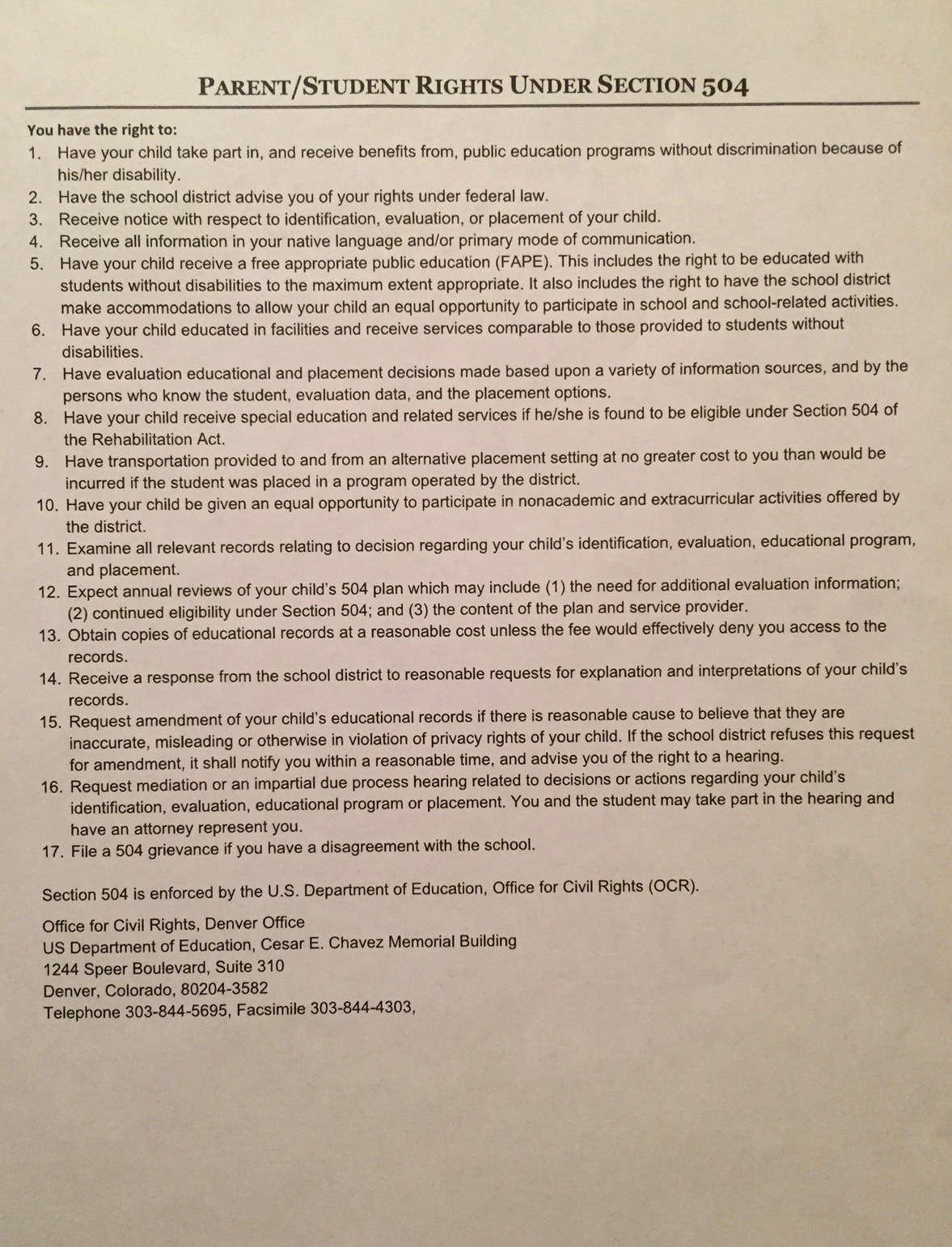Accommodations
504
To most people it’s just a number, no different in importance than 302 or 145. To our family 504 is a safety net, a legal document, and the assurance that our kids matter in the public school system.
Under the Rehabilitation Act of 1973 students with physical or mental disabilities are guaranteed equal access to state and federally funded programs, such as public schools. A 504 plan is created, regardless of academic success or challenges, to ensure reasonable accommodations be made by school faculty and staff in order for the child to receive the same educational experience as other children.
What constitutes a disability, you might ask? The Americans with Disabilities Act defines an individual with a disability as “a person who has a physical or mental impairment that substantially limits one or more major life activities, a person who has a history or record of such impairment, or a person who is perceived by others as having such an impairment.” I have friends who have had to lobby for the their children to be protected by a 504, but thankfully we didn’t have to jump through any hoops since diabetes is a pretty straightforward disability. A non-functioning pancreas leads to all kinds of fun limitations to major life activities, the main one being LIVING. So, yeah, I’d say we’ve got the whole “disabled or not” argument pretty well figured out.
Accommodations. It’s a word I love as much as I hate. I love it, because it means my kids are safe and cared for while they’re at school. But in daily life I hate what it implies. It suggests that my kids and my husband need to be treated differently. Really, they’re just like everyone else in most ways. Literally, an accommodation is the act of adjusting or adapting to someone or something. In reality Marshall, Walker, and Ollie are constantly the ones who do the adjusting. We know navigating security lines will take a bit longer, sports activities will be delayed for low or high blood sugars, and the prospect of a sleepover at a friend’s house is a distant reality. My family is constantly doing the adjusting. At school, however, today alone, there were probably 10 or more instances where “adjustments” had to be made. Maybe Walker needed access to water when the other children were told no. Or Ollie needed an extra bathroom break during math. If their blood sugars are too high or low they may postpone testing, or be allowed extra time to complete their assignment. The kids get to eat when other children do not. Most importantly, they have an army of adults ensuring they are safe, every second of every moment they are at school. These aren’t frivolous adjustments. These are accommodations to ensure survival.
They are also accommodations to ensure a quality education and evaluative process. It’s stated in both kids’ 504s, as well as any Type 1 student I’ve ever known, that they will not be tested if their blood sugars are outside an acceptable range. When blood sugars are too high or low focus, recall, confidence, and basic physical functions are compromised. This can sometimes be the hardest concept for teachers to grasp. Marshall and I explain it over and over again, but it’s the one most overlooked for one simple reason: the kids don’t look unwell. With the exception of a CGM on their arm, or a piece of tubing peeking out from their belt line, they look just like any other kid. Ollie might appear to be right on task, when in actuality his mind is floating somewhere else. Walker has a tendency to get easily distracted when her blood sugars are out of whack, and it comes across to teachers that she’s being unorganized and flakey. All of these traits are the work of high blood sugar. It is unfair to evaluate the kids as students when they are dealing with the impact of hyperglycemia (or hypo for that matter). It’s not a clear representation of who they are, and the 504s make certain we have the authority to tell the teachers so. If the kids aren’t performing as they should, or their grades are less than ideal, we want to be certain it’s an evaluation of their true abilities, not those under the influence of high or low blood sugar.
We all need to make adjustments to function in society. Even with a legal 504 plan my kids are still adjusting their daily life to their medical needs and the scrutiny of others. The kids are well aware of the accommodations THEY need to make for their diabetes. But when it comes to the case of a disability, there are thankfully laws in place to protect the safety and well-being of my children, and all children, while they are in school. They know full well that judgements will be made and accommodations will lie fully on their shoulders, but for this short school age let them have the chance to be free of the burden.









